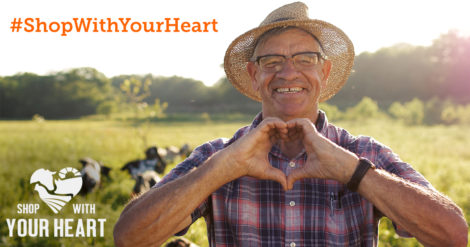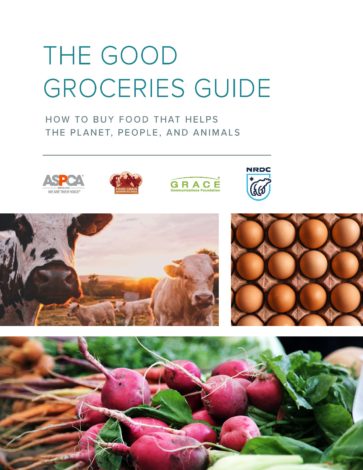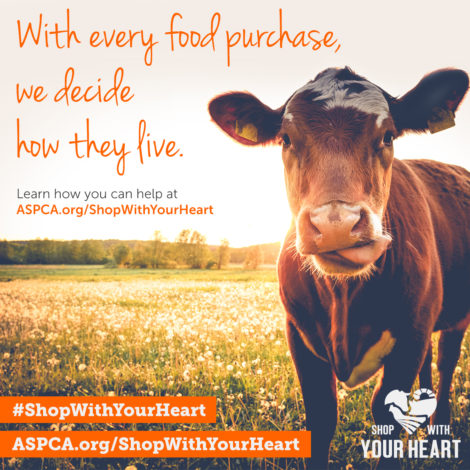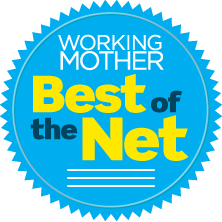There are probably not many people who know and understand what the term “factory farmed” actually means. I am sure you can take a guess. And if you’re sitting down eating right now, take a look at what’s on your plate and ask yourself – was this raised in a factory or on a farm? Everyone should be more aware of this process and the practices designed to maximize efficiency and profit, and little regard for animals’ well-being.
Not sure what this all means? It’s okay! The only way for us to make better choices is to gain more knowledge:
What does it mean to “Shop with Your Heart”?

Shopping with your heart means using your purchasing power to improve farm animals’ lives by rejecting factory-farmed meat, eggs and dairy. Opt for plant-based alternatives or animal products bearing meaningful animal welfare certifications: Animal Welfare Approved, Certified Humane and Global Animal Partnership Steps 2+.
Visit our Bring Your Store On Board page to see other ways to have a big impact and get your local market involved. You can drop off a request for certified items with your supermarket manager, tweet at your store asking for higher-welfare products or review it on Yelp. We also hope that you’ll share information about this issue with friends and family. Every little bit helps.
What are the most frequently misunderstood food labels?
One of the biggest offenders is the term “natural.” It’s almost comical how little that word means! “Natural” has nothing to do with where animals are raised, how they are treated or even what they’re fed.
“Cage-free” is another tricky label. The cage-free claim on eggs does mean that the hens who laid them did not spend their entire lives in inhumane wire cages, and that is a good thing. But it doesn’t mean they had any access to the outdoors, or even adequate space or enrichments in that indoor environment. To further complicate things, the term “cage-free” on a package of chicken or turkey meat adds no value because meat birds are never raised in cages. Learn more about other tricky claims on food packages in our label guide.

What makes certain welfare certifications qualify as “meaningful,” while others are not recommended?
A truly meaningful welfare certification has 1) standards high enough to address animals’ physical, emotional and natural needs, and 2) strong oversight in place to ensure participating farms are actually meeting those standards.
Each of the three programs that the ASPCA highlights for consumers (Certified Humane, Animal Welfare Approved and Global Animal Partnership Steps 2 and above) meet these criteria. They vary in the level of welfare they require, but all have comprehensive, on-farm welfare standards developed by scientists and veterinarians; they ban worst practices, including caging and crowding; all require enriched environments that encourage natural behaviors; and all require independent audits of farms for 100% compliance with standards that are available online for consumer transparency. While other certifications offer some improvements for animals, they fall short by allowing certain unacceptable practices such as caging, or allow for less than 100% compliance with standards. Consumers expect more and animals deserve better.
A Good Groceries Guide on how to help people, animals, and the planet.

Animals make our lives better in so many ways—let’s return the love. A few simple changes to how we shop can improve life for billions of farm animals suffering on inhumane factory farms.
As a consumer, you have the power to change how food companies treat farm animals. Take the first step today: Sign the pledge to Shop With Your Heart and the ASPCA will send you everything you need—lists of brands, label guides and more!
And don’t forget to enter to win some fun items from the ASPCA!
